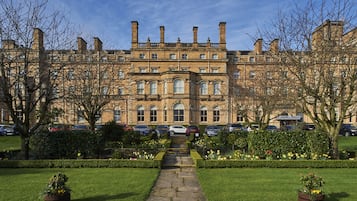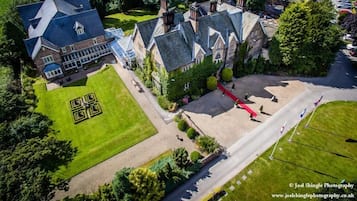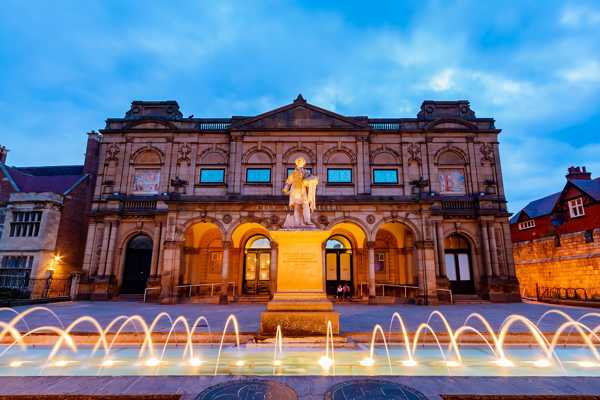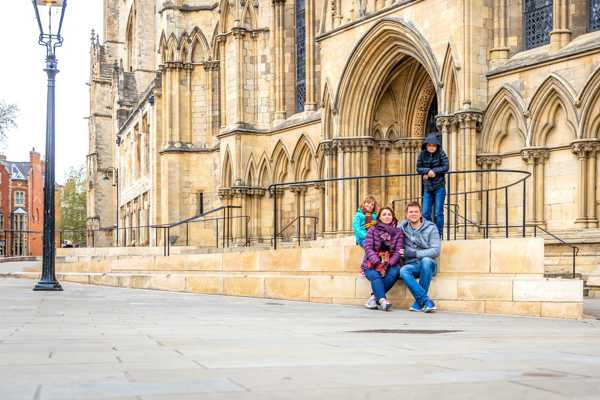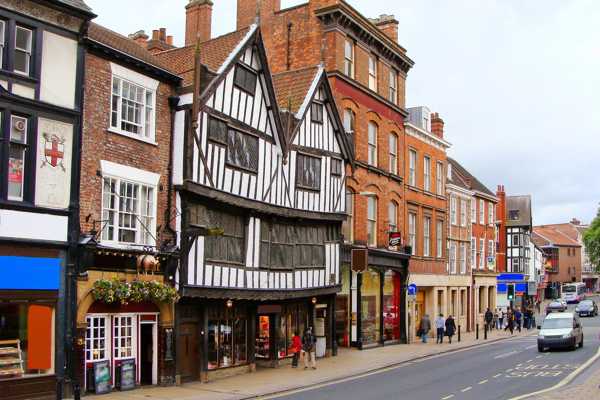The towns and villages near York are packed with history, including some locations where major moments of British history took place. Many consist of lovely, old stone houses clustered around an ancient church or, in some cases, an old-fashioned pub.
Many of the towns in our list have a quaintly local feel. Famous fast-food brands are hard to find, for example, with an array of small and unique businesses taking their place. Most also demonstrate the famous friendliness of Yorkshire, so expect a cheery welcome.
- 1
Selby
The historical heart of a rural community

- Tarih
- Fotoğraf
Selby is the main hub town for a collection of small villages about 15 miles south of York, at the other end of the A19. It’s a curious patchwork of streets and buildings from different eras, all around the impressive Selby Abbey. Built in 1069, it’s one of the very few abbeys in England that survived the Dissolution of the Monasteries in the 1530s. Be sure to check out its beautiful stained-glass windows, including the Washington Window. Part of it – through a very convoluted story – is said to have inspired the US national flag.
Some of the villages around Selby have some interesting features that make them worth exploring if time permits – Skipwith and Cawood both have beautiful nature reserves.
Harita - 2
Malton
A hub of family-friendly attractions

- Macera
- Aileler
- Yemek
- Tarih
- Fotoğraf
Malton is a delightful historical market town on the River Derwent with a lot of claims to fame. Located about 20 miles northeast of York, it’s been named the food capital of Yorkshire, the most dog-friendly town in the UK and is a hub of major attractions. At its heart is the marketplace, which is the main centre of commerce for the surrounding villages (particularly on Saturdays, which is market day) and is ringed by great cafés and pubs.
Within easy reach of Malton, you’ll find the Flamingo Land Resort theme park and zoo and Eden Camp Modern History Theme Museum, which is a fascinating, family-friendly place that brings the Second World War to life. The town itself contains the Malton Museum, the impressive Castle Gardens and plenty of beautiful old streets.
Harita - 3
Tadcaster
Fancy a pint?

- Yemek
- Tarih
- Fotoğraf
If you’re fond of a pint, Tadcaster is certainly going to be an interesting destination for you. Located 10 miles southwest of York, the town is famous for its long association with the brewing industry and remains the home of the oldest brewery in Yorkshire – Samuel Smith’s Old Brewery. As you might expect, there’s no shortage of pubs around town, too.
Other attractions in Tadcaster include The Ark – the oldest building in active use in the town. It’s had various uses since it was built in the late 15th-century. In the 17th century, it was a meeting hall where the Pilgrim Fathers were thought to have planned their trans-Atlantic voyage.
Harita - 4
Pocklington
The gateway to the Wolds

- Tarih
- Fotoğraf
Pocklington is the gateway to the Yorkshire Wolds, a beautiful rural region of low hills and verdant valleys. Located 12.5 miles east of York, Pocklington has a distinctly rural vibe itself, making it almost more like a big village than a small town. At its heart is a small marketplace (which is filled with stalls on Tuesdays) in the shadow of the Church of All Saints, which dates back to 1190. The lovely nearby village of Barmby Moor has the same quaint, quiet rural feel in spades, too.
The beautiful Burnby Hall Gardens are well worth a visit. They were donated to the people of Pocklington by Percy Marlborough Stewart, having been populated with rare and exotic plants from around the world, brought back to Burnby Hall from Percy’s many travels with his wife, Katherine.
Harita - 5
Elvington
An aerodrome with a village attached

- Tarih
- Fotoğraf
Elvington is best known for its airfield, which is now the Yorkshire Air Museum & Allied Air Forces Memorial. The airfield was first opened in 1939 and saw extensive use by bomber aircraft throughout the Second World War and the Cold War. There are still several giant aircraft on the airfield – the museum’s star attractions.
The village itself is just 7 miles southeast of York and there’s really not much to the place other than the Yorkshire Air Museum. Along with some other nearby villages, it has that distinctive olde-worlde charm that rural England is known for. Good examples include Wheldrake, East Cottingsworth and Melbourne.
Haritafotoğraf: Ronnie Macdonald (CC BY 2.0) değiştirildi
- 6
Welburn
An entryway to outstanding natural beauty

- Tarih
- Fotoğraf
The historical village of Welburn is the gateway to the Howardian Hills Area of Outstanding Natural Beauty. It’s near to the famous Castle Howard – a beautiful stately home with amazing decorative gardens. The surrounding area is very popular with walkers and bird-watchers – it certainly earns its classification as an Area of Outstanding Natural Beauty!
The village itself, which is about 14 miles northeast of York, consists of little more than a couple of small streets of the main road. Its limestone buildings give it a very charming look, as does the old-fashioned red telephone box – one of very few left in Yorkshire.
Harita - 7
Stamford Bridge
Where the age of the Vikings ended in the UK

- Tarih
- Fotoğraf
Stamford Bridge may look like nothing special now, but it was a turning point of English history 1,000 years ago. In 1066, shortly before the more famous Battle of Hastings, the Battle of Stamford Bridge marked the end of the Viking era when King Harold defeated Harald Hardrada and the invading Norsemen. The site is now marked with a simple plaque on a boulder in a small park.
Located about 8 miles east of York, there’s not that much to the village of Stamford Bridge. The namesake bridge across the River Derwent is charmingly historic but, being only a single lane wide, is a bit of a choke point for traffic.
Haritafotoğraf: Keith Laverack (CC BY-SA 2.0) değiştirildi
- 8
Towton
The bloodiest battlefield in Britain

- Tarih
- Fotoğraf
Towton is a tiny country village about 13 miles southwest of York, consisting of very little more than a few houses around a pub. To be fair, they are very pretty stone houses and The Rockingham Arms is a very respectable pub, but they are certainly not what the village is best known for.
The Battle of Towton took place just south of the village in 1461, as part of the Wars of the Roses. A decisive home win for the Yorkists, it’s been described as probably the largest and bloodiest battle fought on English soil. Estimates put casualties from the battle at close to 10,000. There are informative signs by the battlefield and the Towton Cross (also called Lord Dacre’s Cross) was erected in the same year as the battle to commemorate the massive loss of life.
Haritafotoğraf: William A Dobson (CC BY-SA 2.0) değiştirildi
- 9
Market Weighton
Big on history

- Macera
- Tarih
- Fotoğraf
Market Weighton is a beautiful market town which, somewhat ironically, doesn’t actually have a regular weekly market. It was once the home of the biggest sheep market in Britain but is now a popular stepping-off spot for walking in the Yorkshire Wolds. In fact, it’s one of the bigger stops on the Yorkshire Wolds Way National Trail.
Located about 20 miles east of York and a similar distance west of Hull, Market Weighton has a somewhat eclectic history, which includes being the birthplace of William Bradley – the Yorkshire Giant and, at 7 ft 9 in, the tallest British man that has ever lived. His life is still celebrated in Market Weighton with the Giant Community Day in May each year. Look out for his life-sized statue in the charming, historical town centre.
Harita - 10
Wetherby
A popular stop on the Great North Road

- Tarih
- Fotoğraf
Wetherby is 12 miles from York and roughly the same distance from Leeds. A lovely historical town, it’s been ranked as among the best places to live in the north of England. Among the star attractions is Wetherby Racecourse, an excellent selection of boutiques and a month-long cultural festival that’s been running every October since 1977. The riverside is an especially beautiful part of town and worth checking out, too.
The town’s history mostly revolves around being an important stop on the Great North Road. Wetherby Bridge, spanning the River Wharfe, is a Grade II listed structure and is surrounded by old coaching inns, many of which still serve travelling visitors.
Harita










